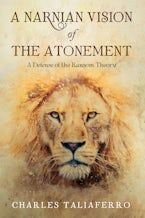- Home
- religion
- literary criticism
- A Narnian Vision of the Atonement
How can we have redemption or atonement (at-one-ment) with God? Ancient Christians proposed a ransom theory, according to which God pays the ransom for us through heroic self-sacrifice so we can be liberated from the power of the demonic, sin, and death. This theory is widely rejected by philosophers and theologians, yet C. S. Lewis boldly portrays atonement in precisely such terms in his seven-volume The Chronicles of Narnia. In this book, philosopher Charles Taliaferro defends the integrity and beauty of redemption in these stories and offers a Narnia-inspired Christian theory of atonement. He writes for those intrigued by Lewis's imaginary world of Narnia and for those interested in thinking about temptation, how wrongdoing may be overcome, confession, repentance, forgiveness and reconciliation, restitution, death, resurrection, and personal transformation. Taliaferro argues that Lewis's work is no mere entertaining fairytale for children but an important lens through which to view deep themes of redemption and atonement, and all the vital stages involved in overcoming evil with the superabundant good of God's loving self-sacrifice.
Charles Taliaferro is professor emeritus of philosophy and Emeritus Oscar and Gertrude Boe Distinguished Professor, St. Olaf College
“This is an engaging, light-hearted but also deeply serious work in defense of Lewis’s Narnia, and of the ‘ransom’ theory of the atonement. Taliaferro makes good sense of the theological notion that Christ ‘paid the price of sin’ and of the moral consistency of Aslan’s ‘ransom’ and rescue of the young Edmund, answering objections to both with sympathy and precision. A book that literary critics and Christian theologians alike should learn from.”
—Stephen R. L. Clark, University of Liverpool
“Taliaferro brings to this project warm affection for Lewis and his Chronicles as well as critical expertise. He deftly plumbs the depths of these delightful stories to give us a creative version of the ransom theory of atonement that skillfully avoids its famous flaws. This is Narnian theology at its sparkling best!”
—Jerry Walls, Houston Baptist University
“This book is a delight to read. Like Lewis himself, Taliaferro combines imagination, erudition, and philosophical acumen with a refreshing clarity of expression. Taliaferro’s playfulness and generosity of spirit shine through his prose, allowing his insights to be easily shared by the reader. One’s views of both atonement and Narnia will be the better for having read this fine book.”
—Victoria S. Harrison, University of Macau
“Charles Taliaferro is well known for handling heavy topics with a light touch. In this illuminating book he explores one of the knottiest problems in Christian doctrine by drawing on both philosophy and fairytales to enhance our understanding of the atonement. The enthusiasm and joy which he brings to this task is infectious.”
—Robert MacSwain, The University of the South
“Leave it to Charles Taliaferro to do what only he can do: write one of the most important new books on atonement, and do it in the context of Lewis’s stories. Taliaferro brings us into the world of Narnia, through the history of philosophy and theology, and back into the world we inhabit with clearer eyes.”
—David L. O’Hara, Augustana University
“In his philosophical and imaginative engagement with C. S. Lewis’s Narnia series, Charles Taliaferro culls and hones a classic but nearly forgotten view of the atonement. In typical Taliaferro fashion, the writing is erudite, winsome, and provocative. This creative gem of a book inspired me both to rethink the ransom theory and to re-read the Chronicles!”
—Chad Meister, Bethel University
“Charles Taliaferro invitingly and insightfully engages Aslan’s sacrifice in the Narnian Chronicles to exposit the deep meaning of the atonement via a rehabilitated ransom theory. Through enlightening analysis, he penetrates right to the core, arguing that, in a Narnia-inspired ransom theory, only Christ could pay the price to free us from captivity to sin that is of our own making.”
—Michael L. Peterson, Asbury Theological Seminary
“Taliaferro has mounted an elegant and delightful apology for the theology of Narnia. In a commentary notable for its philosophical and theological learning, ranging from the Alexandrian and Cappodocian fathers to contemporary analytic theology, Taliaferro explores the soteriology of Lewis’s classic tale with intellectual brio and spiritual penetration.”
—Douglas Hedley, University of Cambridge
“Charles Taliaferro is one of the most creative philosophers I know. His A Narnian Vision of Christian Atonement combines incisive theological knowledge with deep religious sensitivity, written in his characteristic entertaining style. Taliaferro shows us how theology can be fun.”
—Linda Zagzebski, University of Oklahoma, emerita
“Charles Taliaferro offers a deep, challenging, and insightful presentation of a ransom theory of atonement. With surprising brevity, A Narnian Vision of Atonement manages not only to cast light on the writings of C. S. Lewis, but also to engage with ancient and modern philosophy, Christian scriptures and theology, and even Shakespeare. Like the theory it espouses, this book could help liberate persons from prisons of our own making.”
—Matthew Dickerson, co-author of Narnia and the Fields of Arbol
“In this fun and fascinating book, Professor Taliaferro wonderfully illustrates how C. S. Lewis’s Chronicles of Narnia can provide us with a fresh, youthful vision of a profound, ancient theological view. Even readers who are unconvinced by the ransom theory Taliaferro defends will be inspired and intrigued by his invitation to see, through imaginative eyes, the incredible beauty and immense costliness of the atoning work of Christ.”
— Adam C. Pelser, United States Air Force Academy
“Taliaferro skillfully applies his keen philosophical mind to Lewis’s imaginative reasoning about theology. The result is a powerfully suggestive rehabilitation of the Ransom Theory, lately an oft-maligned theory of atonement. A Narnian Vision of the Atonement provocatively—even magically—demonstrates the genius of Lewis and his relevance for theology and life. Taliaferro’s book is philosophical theology at its best: full of wonder; rigorous, clear, and faithful to Scripture; historically informed; and just plain fun.”
—Paul M. Gould, Palm Beach Atlantic University



